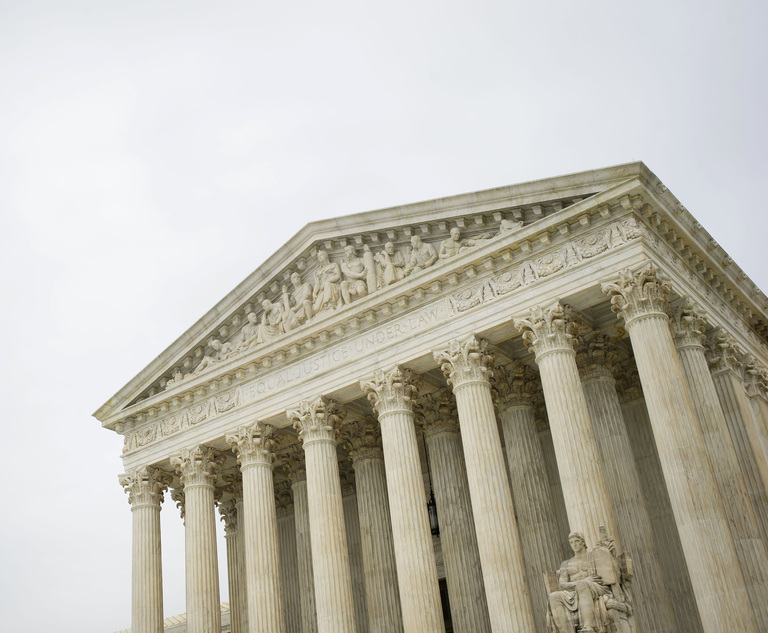'Mallory v. Norfolk Southern Railway'—Another General Jurisdiction Sea Change or Much Ado About Nothing?
Last month, the Supreme Court held that general jurisdiction can extend further without offending due process. In Mallory v. Norfolk Southern Railway, the court upheld Pennsylvania's exercise of general jurisdiction over a corporation that consented to jurisdiction as a condition of registering to do business under a statute similar to the one at issue in Pennsylvania Fire.
August 11, 2023 at 09:54 AM
8 minute read
 U.S. Supreme Court building in Washington, D.C. Photo: Diego M. Radzinschi/ALM
U.S. Supreme Court building in Washington, D.C. Photo: Diego M. Radzinschi/ALM
Background
In 1917, the U.S. Supreme Court rejected a due process challenge to a Missouri statute that required corporations to consent to personal jurisdiction for all purposes as a condition of registering to do business in the state. That case, Pennsylvania Fire Insurance v. Gold Issue Mining & Milling, was never overruled. Many believed, however, that the "Court's transformative decision on personal jurisdiction in International Shoe" invalidated corporate registration as a basis for all purpose or "general" jurisdiction. The Supreme Court recently reinforced that belief in Daimler AG v. Bauman, holding that absent exceptional circumstances, corporations are only subject to general jurisdiction in two "paradigm" forum states—where they are incorporated and where they maintain their principal place of business.
But, last month, the Supreme Court held that general jurisdiction can extend further without offending due process. In Mallory v. Norfolk Southern Railway, the court upheld Pennsylvania's exercise of general jurisdiction over a corporation that consented to jurisdiction as a condition of registering to do business under a statute similar to the one at issue in Pennsylvania Fire. At first glance, Mallory appeared to significantly expand general jurisdiction and potentially undo the limits announced in Daimler. Its true impact, however, is far from clear. Unless additional states adopt statutes like Pennsylvania's, and unless those statutes survive another looming constitutional challenge under the dormant commerce clause, Mallory's apparent "sea change" may prove to be "much ado about nothing."
Historic Due Process Limitations on Personal Jurisdiction
The Supreme Court has long recognized that due process limits a state's ability to exercise jurisdiction over foreign corporations that have not consented to jurisdiction in that state. Originally, personal jurisdiction hinged on the defendant's "presence within the territorial jurisdiction of the court." But in International Shoe, the court held that exercising jurisdiction over a nonresident corporation satisfies due process if the company has "certain minimum contacts with [the forum state], such that the maintenance of the suit does not offend traditional notions of fair play and substantial justice."
This content has been archived. It is available through our partners, LexisNexis® and Bloomberg Law.
To view this content, please continue to their sites.
Not a Lexis Subscriber?
Subscribe Now
Not a Bloomberg Law Subscriber?
Subscribe Now
NOT FOR REPRINT
© 2025 ALM Global, LLC, All Rights Reserved. Request academic re-use from www.copyright.com. All other uses, submit a request to [email protected]. For more information visit Asset & Logo Licensing.
You Might Like
View All

Rudy Giuliani's Story Arc in the Southern District of New York


You’re Sure You’ve Looked? The Use of Jackson Affidavits and Efforts to Locate Discovery Materials
8 minute readLaw Firms Mentioned
Trending Stories
- 1Uber Files RICO Suit Against Plaintiff-Side Firms Alleging Fraudulent Injury Claims
- 2The Law Firm Disrupted: Scrutinizing the Elephant More Than the Mouse
- 3Inherent Diminished Value Damages Unavailable to 3rd-Party Claimants, Court Says
- 4Pa. Defense Firm Sued by Client Over Ex-Eagles Player's $43.5M Med Mal Win
- 5Losses Mount at Morris Manning, but Departing Ex-Chair Stays Bullish About His Old Firm's Future
Who Got The Work
J. Brugh Lower of Gibbons has entered an appearance for industrial equipment supplier Devco Corporation in a pending trademark infringement lawsuit. The suit, accusing the defendant of selling knock-off Graco products, was filed Dec. 18 in New Jersey District Court by Rivkin Radler on behalf of Graco Inc. and Graco Minnesota. The case, assigned to U.S. District Judge Zahid N. Quraishi, is 3:24-cv-11294, Graco Inc. et al v. Devco Corporation.
Who Got The Work
Rebecca Maller-Stein and Kent A. Yalowitz of Arnold & Porter Kaye Scholer have entered their appearances for Hanaco Venture Capital and its executives, Lior Prosor and David Frankel, in a pending securities lawsuit. The action, filed on Dec. 24 in New York Southern District Court by Zell, Aron & Co. on behalf of Goldeneye Advisors, accuses the defendants of negligently and fraudulently managing the plaintiff's $1 million investment. The case, assigned to U.S. District Judge Vernon S. Broderick, is 1:24-cv-09918, Goldeneye Advisors, LLC v. Hanaco Venture Capital, Ltd. et al.
Who Got The Work
Attorneys from A&O Shearman has stepped in as defense counsel for Toronto-Dominion Bank and other defendants in a pending securities class action. The suit, filed Dec. 11 in New York Southern District Court by Bleichmar Fonti & Auld, accuses the defendants of concealing the bank's 'pervasive' deficiencies in regards to its compliance with the Bank Secrecy Act and the quality of its anti-money laundering controls. The case, assigned to U.S. District Judge Arun Subramanian, is 1:24-cv-09445, Gonzalez v. The Toronto-Dominion Bank et al.
Who Got The Work
Crown Castle International, a Pennsylvania company providing shared communications infrastructure, has turned to Luke D. Wolf of Gordon Rees Scully Mansukhani to fend off a pending breach-of-contract lawsuit. The court action, filed Nov. 25 in Michigan Eastern District Court by Hooper Hathaway PC on behalf of The Town Residences LLC, accuses Crown Castle of failing to transfer approximately $30,000 in utility payments from T-Mobile in breach of a roof-top lease and assignment agreement. The case, assigned to U.S. District Judge Susan K. Declercq, is 2:24-cv-13131, The Town Residences LLC v. T-Mobile US, Inc. et al.
Who Got The Work
Wilfred P. Coronato and Daniel M. Schwartz of McCarter & English have stepped in as defense counsel to Electrolux Home Products Inc. in a pending product liability lawsuit. The court action, filed Nov. 26 in New York Eastern District Court by Poulos Lopiccolo PC and Nagel Rice LLP on behalf of David Stern, alleges that the defendant's refrigerators’ drawers and shelving repeatedly break and fall apart within months after purchase. The case, assigned to U.S. District Judge Joan M. Azrack, is 2:24-cv-08204, Stern v. Electrolux Home Products, Inc.
Featured Firms
Law Offices of Gary Martin Hays & Associates, P.C.
(470) 294-1674
Law Offices of Mark E. Salomone
(857) 444-6468
Smith & Hassler
(713) 739-1250






